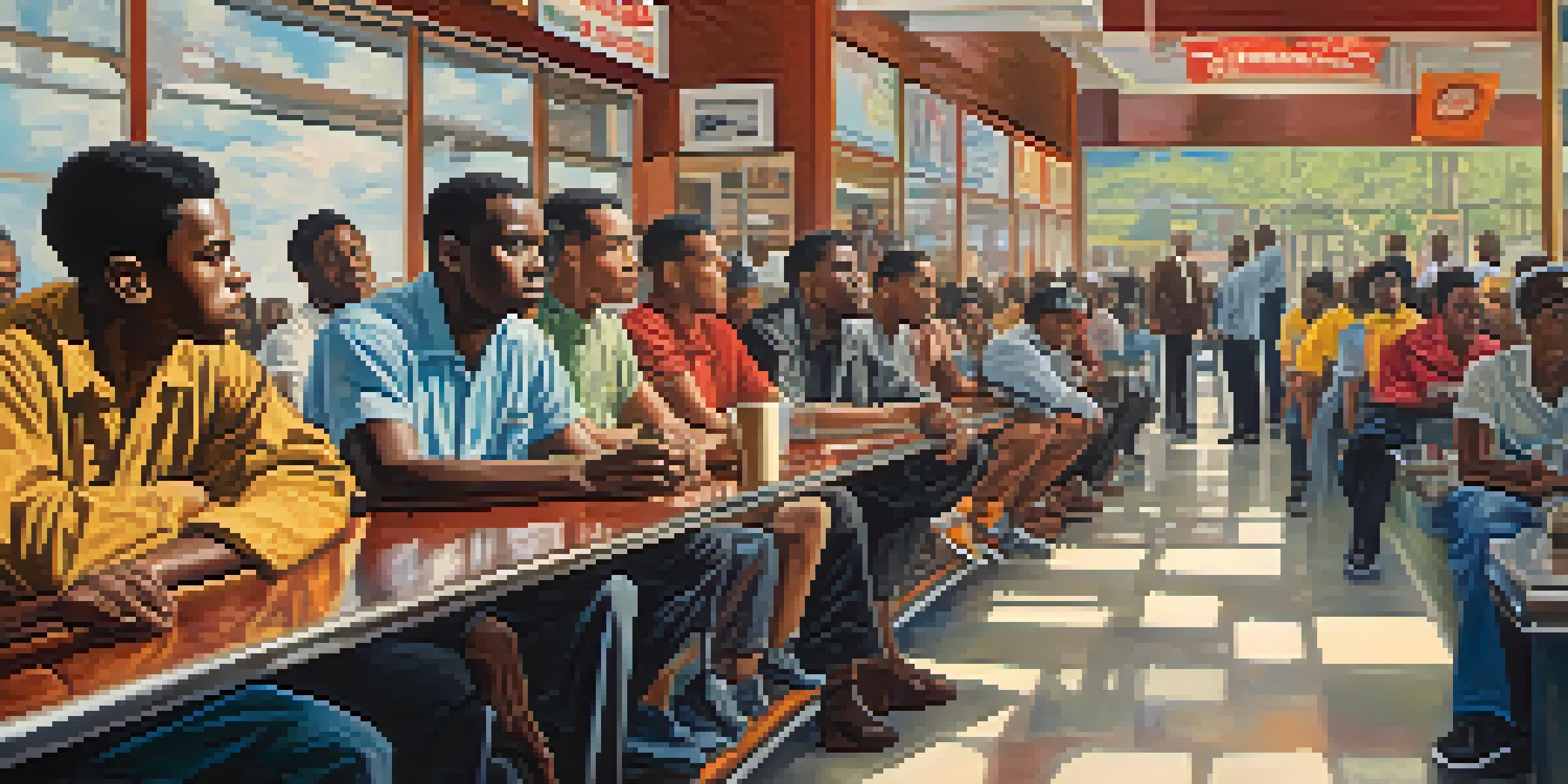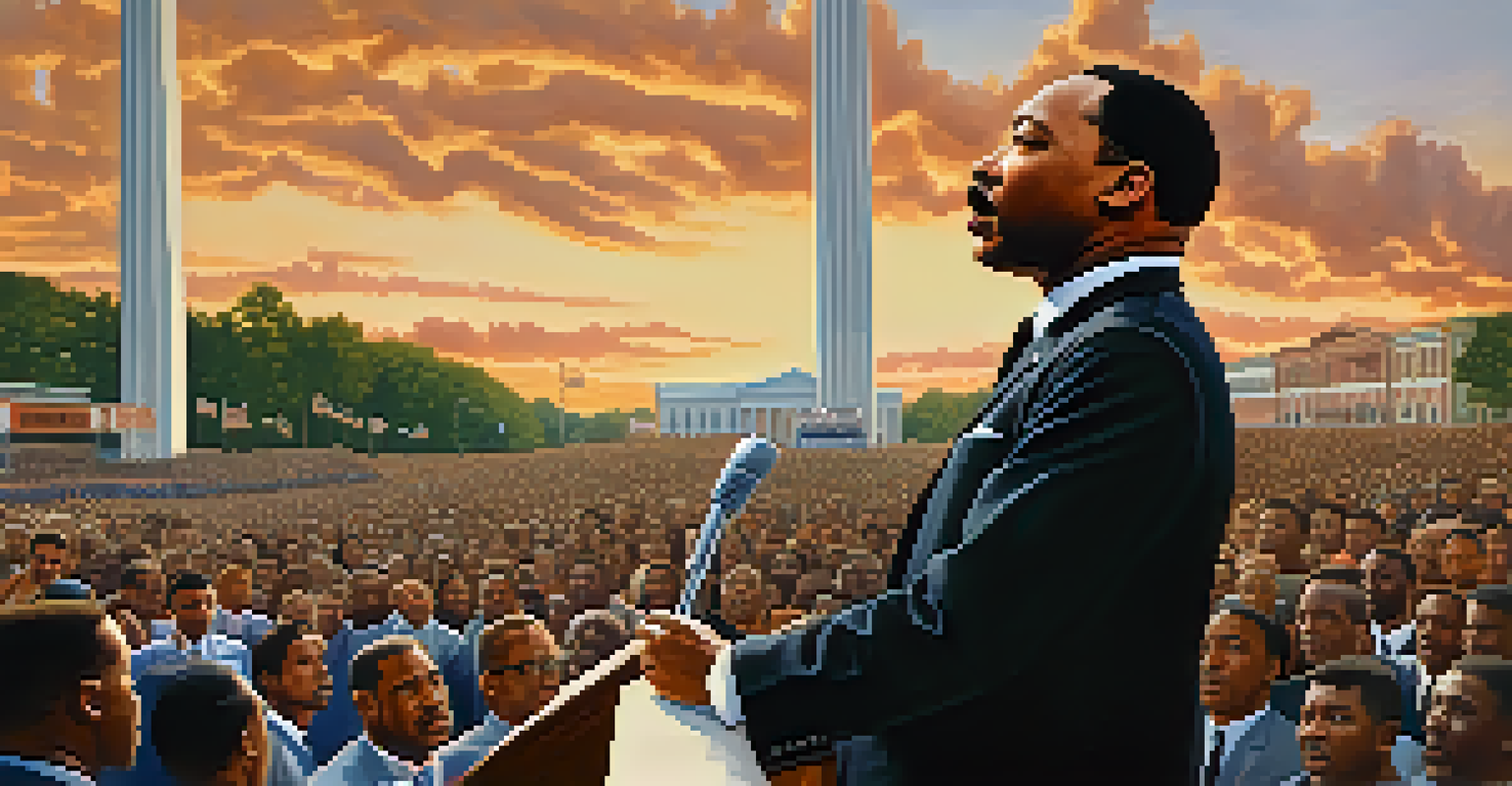Atlanta Civil Rights Movement: An Educational Overview

The Roots of the Atlanta Civil Rights Movement
The Atlanta Civil Rights Movement has deep roots in the city's history, dating back to the late 19th century. With its significant African American population, Atlanta became a focal point for education and activism. Institutions like Morehouse College and Spelman College fostered leaders who would later play pivotal roles in the struggle for equality.
Injustice anywhere is a threat to justice everywhere.
In the early 20th century, segregation laws and discriminatory practices were rampant. Activists began to organize against these injustices, laying the groundwork for a more significant movement. Key figures emerged, including W.E.B. Du Bois and the founders of the NAACP, who sought to challenge the status quo.
These early efforts set the stage for the mass mobilization that would follow in the 1950s and 1960s. The city's rich history of resistance and resilience contributed to a climate ripe for change, making it a crucial battleground for civil rights.
Key Figures in Atlanta's Civil Rights Movement
Atlanta's Civil Rights Movement featured a number of influential leaders whose contributions shaped its course. Martin Luther King Jr., born in Atlanta, emerged as a prominent voice advocating for nonviolent protest and social justice. His commitment to peaceful activism resonated with many and inspired movements across the nation.

Other notable leaders included Ralph David Abernathy and Hosea Williams, who worked alongside King to organize protests and marches. Their collaboration was essential in mobilizing communities and raising awareness about the need for change. Together, they formed the Southern Christian Leadership Conference (SCLC), which became a key player in the movement.
Historical Roots of Activism
The Atlanta Civil Rights Movement emerged from a rich history of African American activism and education dating back to the late 19th century.
These leaders not only fought for civil rights but also inspired a generation of activists. Their legacies continue to influence social justice movements today, reinforcing the importance of community and collective action.
Major Events and Protests in Atlanta
The Atlanta Civil Rights Movement was marked by a series of significant events and protests that captured national attention. One of the most notable was the 1960 sit-in campaign at local lunch counters, where students peacefully protested segregation. This tactic quickly spread to other cities, showcasing the power of nonviolent resistance.
The time is always right to do what is right.
In 1963, the Birmingham Campaign, led by King and other activists, highlighted the brutal nature of segregation in the South. Atlanta residents rallied in support, demanding the end of racial discrimination. This solidarity was pivotal, as it galvanized public opinion and drew media attention to the plight of African Americans.
Another key event was the Atlanta Freedom March in 1965, which brought thousands together to advocate for civil rights. These demonstrations were not just about protesting; they were about uniting communities and fostering a sense of hope and determination.
The Role of Education in the Movement
Education played a crucial role in the Atlanta Civil Rights Movement, serving as both a catalyst for change and a means of empowerment. Historically black colleges and universities (HBCUs) like Morehouse and Spelman produced many of the movement's leaders. These institutions provided a space for young activists to develop their ideas and strategies.
In addition to formal education, community education initiatives emerged to inform citizens about their rights. Workshops and meetings were organized to teach people about the legal system and the importance of voter registration. This grassroots approach helped to build a more informed and engaged community.
Influential Leaders and Their Impact
Key figures like Martin Luther King Jr. and Ralph David Abernathy played pivotal roles in mobilizing communities and advocating for civil rights.
As education became intertwined with activism, it fostered a sense of purpose and urgency. Activists recognized that knowledge was a powerful tool in the fight against injustice, and they used it to inspire others to join the cause.
The Impact of Media Coverage
Media coverage significantly impacted the Atlanta Civil Rights Movement, bringing national attention to local struggles. Photographs and news reports of protests and confrontations were broadcast across the country, highlighting the harsh realities faced by African Americans. This exposure helped to galvanize public support for the movement.
Television played a pivotal role in shaping perceptions of the movement. Iconic images of peaceful protests met with violent opposition shocked many viewers, leading to increased pressure on lawmakers to enact change. The media served as a bridge, connecting the struggles in Atlanta to a broader audience nationwide.
As a result, media coverage became both a tool and a weapon in the fight for civil rights. Activists learned to use it strategically, understanding that public opinion could influence legislation and societal attitudes toward race.
Legislation and Legal Changes Arising from the Movement
The Atlanta Civil Rights Movement played a fundamental role in shaping legislation that addressed racial discrimination. The tireless efforts of activists led to the passage of the Civil Rights Act of 1964, which outlawed discrimination based on race, color, religion, sex, or national origin. This landmark legislation was a direct result of the pressure exerted by movements like those in Atlanta.
Additionally, the Voting Rights Act of 1965 was another significant victory, ensuring that African Americans had the right to vote without discriminatory practices. These legal changes were crucial in dismantling systemic barriers and allowed for greater political representation.
Media's Role in Advocacy
Media coverage of protests significantly shaped public perception and support for the Atlanta Civil Rights Movement, highlighting the struggles faced by African Americans.
The impact of this legislation extended beyond Atlanta, influencing civil rights movements throughout the country. It set a precedent for future generations, demonstrating that collective action could lead to tangible change in the legal landscape.
Legacy of the Atlanta Civil Rights Movement
The legacy of the Atlanta Civil Rights Movement continues to resonate today, serving as a reminder of the ongoing struggle for equality. The achievements of activists laid the groundwork for future movements while inspiring individuals to advocate for social justice in their own communities. Their courage and determination are memorialized in various monuments and educational programs.
Moreover, the principles of nonviolence and community engagement established during this period remain relevant. Today's activists often draw upon the strategies and lessons learned from their predecessors, emphasizing the importance of solidarity and collective action.

As we reflect on this legacy, it becomes clear that the fight for civil rights is far from over. The Atlanta Civil Rights Movement not only transformed the city but also left an indelible mark on the nation, reminding us of the power of unity in the face of adversity.